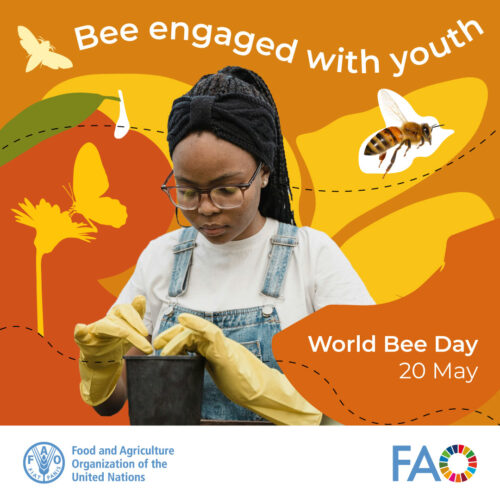World Bee Day 2024 celebrates the vital role of youth in beekeeping and pollinator conservation under the theme “Bee Engaged with Youth.” This year’s theme underscores the importance of global cooperation to safeguard food security and sovereignty, preserve rural and urban livelihoods, combat biodiversity loss, and foster a sense of unity and shared responsibility in our global community. Uniting young individuals worldwide to protect these essential species is crucial to achieving this.
Bees play an essential role in our health, supporting agriculture and biodiversity worldwide. Without pollination, most of our food would not reach our plates. However, these vital insects are facing a number of deadly threats linked to habitat loss, the use of toxic pesticides and climate change. Observing World Bee Day highlights the urgent need to maintain healthy agricultural practices and protect and enhance pollinator populations. This global day of action calls on governments, organizations, businesses, civil society, and concerned citizens to promote actions that support the sustainable development of beekeeping and pollinator and ecosystem conservation.
This year’s focus on youth engagement is significant. YenKasa Africa champions this topic through its features on young beekeepers across the continent. By involving young people in beekeeping activities, educational initiatives, and advocacy efforts, we can inspire a new generation of environmental leaders who can contribute to a sustainable and profitable beekeeping value chain.
Youth engagement fosters environmental stewardship and promotes entrepreneurship and community resilience. Beekeeping offers accessible income opportunities with minimal start-up costs, making it an attractive venture for young individuals in rural and urban areas.
Adopting pollinator-friendly food production and ecosystem conservation practices is essential to addressing the decline in pollinator populations. These include but are not limited to, mixed cropping, minimizing or eliminating toxic pesticide use, and supporting local beekeepers. Such practices improve food quality and quantity, foster increased local ownership of food systems, and benefit human populations and ecosystems.
By supporting youth-led beekeeping initiatives, governments, businesses, and NGOs can empower young people to build their autonomy and dignity, become leaders in beekeeping, and address the challenges facing pollinator populations. Educational programs in schools, coupled with apitourism experiences (educational tours of beekeeping operations), can spark a lifelong passion for nature and environmental responsibility in young minds, fostering a new generation of beekeepers, and ecosystem stewards.
Through collective action, we can ensure a future where bees and other pollinators continue to thrive, and the beekeeping industry flourishes. By engaging young people and adopting pollinator-friendly practices, we can secure a sustainable and abundant future for ourselves and future generations.
Explore the YenKasa Africa sites for related information on beekeeping and the bee value chain in Africa via the links below;
Featured
Articles and Stories
- Good practices in beekeeping for a sustainable honey value chain in Tanzania
- ANAP- Algeria: An effort to professionalize beekeeping
- The Gourma Honey: A model of sustainable development and prosperity
- More than 31 million bees lost due to insecurity in North Kivu (CEMADI)
Radio

